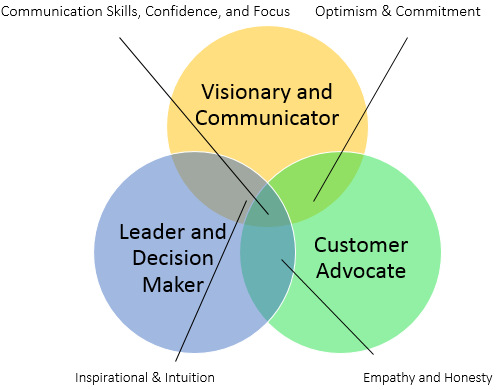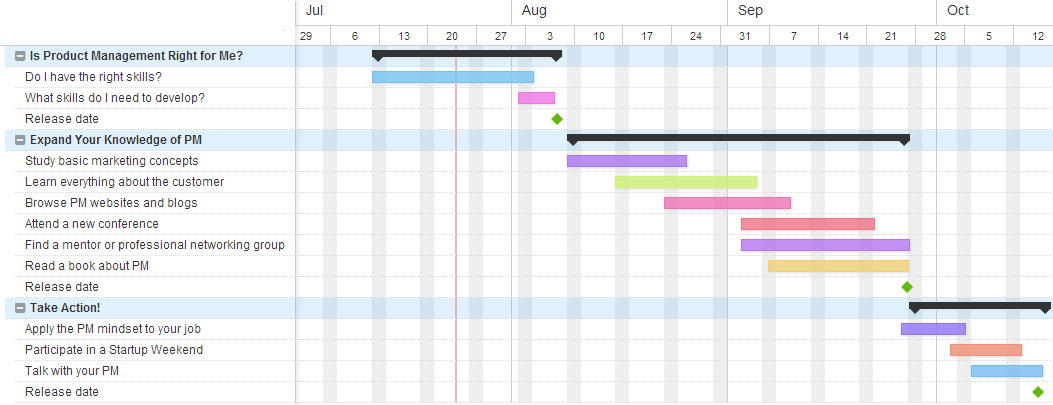From Developer to Product Manager: A 3 Stage Plan
Key Takeaways
- Developers considering a transition to product management should first evaluate their ability to empathize with customers, communicate effectively with various teams, and manage projects and people. Strong problem-solving and analytical skills, common among developers, are also crucial for product management.
- To prepare for a product management role, developers should expand their knowledge of marketing concepts and techniques, as well as deepen their understanding of the customer. This can be achieved through reading industry publications, attending conferences, networking with product managers, and utilizing resources like product management websites and blogs.
- Developers can begin to apply a product manager mindset to their current role by considering every project from a product management perspective. Participating in events like Startup Weekends can provide hands-on experience with the various aspects of product management, including brainstorming solutions, interviewing customers, and collaborating with a team to create a minimum viable product.
Product managers, also known as PMs or “mini-CEOs”, are the people in charge of strategically guiding a product through its life cycle. They are driven to maximize the ROI of a product by managing the development team and serving as the collective voice of the customer. If you’re interested in a dynamic career involving technology, business, and user design, product management might be for you – especially if you have a development background.
It’s certainly not uncommon for developers or other employees serving in technical roles to eventually transition to product management. Some developers may find they enjoy managing the product road map and solving customers’ problems rather than writing code and building the product themselves. Other seasoned engineers may be searching for a suitable career transition into a management position.
If you’re interested in moving to product management in the future, here are three critical steps to make the transition.
1. Decide Whether You’re Right for Product Management
You’ll find there are very few formally trained product managers out there in the world. Instead, many of them have moved into the role after previous careers as developers, marketing managers, business analysts, and salespeople.
Of these, developers usually have several qualities that help them thrive as product managers, primarily:
- Strong problem solving abilities.
- Experience with product development and working with the development team.
- Exemplary analytical skills
However, not all developers are suited to a product management role. Before setting down the product management path, be sure to ask yourself these questions.
Can I understand and empathize with customers?
Customers are the most important part of any business and the main responsibility of any product manager is to understand their problems and needs. Not all developers are able to put themselves in the customer’s mindset to identify current frustrations and foresee future problems. Furthermore, you’re responsible for serving as the bold voice of the customer within the workplace. You have to be willing to remind and educate everyone about the customer’s most pressing issues at all times.
Can I interact and communicate with multiple teams?
Product managers coordinate and interact with almost every team inside a business. They must be able to present plans and goals to management, coordinate the announcement of new development features with marketing, receive customer feedback from customer support, and converse with customers themselves. As a product manager, you need to be able to speak different languages when conversing with different groups. A talk with the development team about daily and weekly goals can require a different terminology than a demonstration of a recently developed product feature with the sales team.
Am I a strong manager?
Product managers are not only responsible for not only overseeing the product, but they also serve as the supervisor of the development team. As a leader, you must be confident in your abilities to delegate efficiently, help team members, and motivate others. You’re the decision maker of the team, responsible for prioritizing and ensuring the development team is always working on the highest-value items for the business. Certain decisions may be small, while others can affect the product roadmap for the next 3 to 6 months. Sometimes the decisions are well-planned and well-researched, and sometimes they are gut decisions you have to make on the fly.
In many instances, you’ll have to be more than just a leader, you’ll have to be a visionary. You’ll have to gather feedback, research your market, and use every ounce of your creativity to envision and produce the perfect product for your customers. Your vision has to be clear and compelling to every single member of your organization.
You need to be confident, focused, optimistic, committed, inspirational, and empathetic and honest. A lack of any one of these qualities can impair your ability to perform the multiples roles of product manager.

2. Expand Your Knowledge of Product Management
If you believe you have the skills and aptitude to succeed and thrive as a product manager, the next step is to make sure you have a sufficient domain knowledge and a strong understanding of basic product management topics and tools. Lack of customer knowledge and lackluster marketing skills are both critical areas most developers have to improve before entering the field of product management.
Study Basic Marketing Concepts and Techniques
As a developer you should already have a strong understanding of software development and the creation of the product. But most developers aren’t as knowledgeable about the marketing aspects of a product management. Depending on the position of your product within the product management life cycle, you should be familiar with marketing strategy including:
- Brand management
- Market research & consumer behavior
- Market segmentation & positioning
Understanding these concepts will help you pinpoint customers’ needs and tailor your product to meet them. Though market research and segmentation is mainly done in the early phase of the product life cycle, brand management is relevant at almost every stage. Once you master these critical marketing concepts, you’ll also be able to effectively collaborate with the marketing manager to plan marketing efforts for the business.
Learn Everything About the Customer
Additionally, most developers have little interaction with a company’s customers. This is a critical problem for potential PMs, because as a product manager you need to be the foremost expert on both the product and the customer! Though many potential PMs aren’t experienced in all aspects of the product management, they are able to successfully transition into the role because they have years or even decades of experience in a specific industry and know absolutely everything about the customer.
The importance of domain knowledge for a product manager cannot be emphasized enough. Read any industry publications, articles, and newsletters to make sure you know your customer inside and out. You need to know who your customers are, what they think, how they operate, what they are struggling with, and – most importantly – how to solve their problems.
More Ways to Learn
Here is a list of tasks you can complete to further refine and expand your knowledge of product management.
Browse Product Management Websites and Blogs
Mind the Product is a community of product managers from all across the globe. Through the site you can search for nearly product management meetups, browse articles from experienced and senior product management professionals, watch videos and lectures about important PM topics, and even examine openings through the job board.
Authored by Dr. Jim Anderson who has more than two decades of experience in product management, The Accidental Product Manager blog for is a great resource for learning how to build, market, and manage products in the global economy. Though some posts may be suitable for more experienced product managers, it still contains tons of relevant info for aspiring PMs.
Attend a Conference
ProductCamps, held in major cities every few weeks, are “unconferences” driven by enthusiastic PMs to discuss the latest tips, techniques, practices for developing and managing the perfect product! Everyone participates and – best of all – it’s free.
Mentor or Professional Networking Group
If you live in or near a big city, you should be able to find and meet with a local or regional association or group of product managers. Some of the largest regional product manager associations include the Silicon Valley Product Management Association and the Boston Product Manager Association. Other popular associations include the Product Development & Management Association and the 280 Group.
Read a Book about Product Management
The Product Manager’s Desk Reference comprehensively covers almost every aspect of a product manager’s job through its nearly 800 pages. While serving as a reference guide for senior product managers, it offers a wealth of information for newcomers about everything from analyzing the financial performance of your products to utilizing storytelling to motivate team members.
Though almost a decade old, Crossing the Chasm, has remained a relevant guide for effective marketing in the always changing high tech industry. It suggests marketers should tailor strategies to complement a single group in the technology adoption life cycle while gradually transitioning to and positioning the product to meet the needs of the next group in the cycle. It’s especially relevant for developers who lack experience with marketing.
3. Take Action!
After you’ve learned a little more about the different aspects of product management and decided whether you have the skills and abilities to succeed, use your newfound knowledge to determine whether you’d enjoy the role and life of a product manager.

Apply the Product Manager Mindset to Your Job
It doesn’t matter if you’re currently an intern, developer, or marketing manager, try to tackle problems and projects with the product manager mindset. Whether you are building out a resource library or improving or reworking documentation, think of every little project as a product manager. What is the problem? Who is the customer? How can I solve the problem?
By applying the product management mindset to your daily tasks, you’ll have a better understanding of how product managers approach problems and gradually engineer solutions to efficiently solve them.
Participate in a Startup Weekend
Startup Weekends are exciting events that allow you to assume the role of a product manager for a short time period in a small and friendly environment! Startup Weekends provide opportunities for marketers, developers, and designers to meet, collaborate, and validate exciting ideas! They are hosted by major cities throughout the world and only cost about $100.
Startup Weekends are perfect opportunities because they give aspiring product managers to experience every aspect of the role. Through the 54 hour period, you’ll brainstorm solutions, interview customers, and communicate with other team members to create a minimum viable product.
At the end of the weekend, every team presents their ideas to a panel of judges. The winning teams are awarded prizes that range from networking opportunities to discounted legal and incorporation services.
By the end, you should have a better understanding of the life of a product manager. You should also have had the chance to talk and learn from other experienced product managers and build your network.
Conclusion
Many developers are able to successfully transition into product management because of their excellent problem-solving skills and extensive experience with the development team. But product management is not for everyone. Product managers must be knowledgeable customer advocates, bold visionaries, and decisive leaders within the workplace.
By learning current marketing techniques, intimately understanding the customer and product, and taking advantage of other PM resources, developers can position themselves for a smooth transition into one of the most exciting and rewarding careers today.
I created this guide with the assistance of Abby Miles, the Product Manager at OpenSesame. Abby Miles has a decade of experience in the software and online training industry and previously worked as a product manager at BlueVolt.
Frequently Asked Questions about Transitioning from Developer to Product Manager
What are the key skills required to transition from a developer to a product manager?
The transition from a developer to a product manager requires a diverse set of skills. Firstly, you need to have a strong understanding of technology, which you already possess as a developer. Secondly, you need to develop business acumen, which includes understanding the market, competition, and customer needs. Thirdly, you need to have strong communication and leadership skills to effectively manage a team and communicate your product vision. Lastly, you need to have a strategic mindset to make decisions that align with the company’s goals and objectives.
How can I gain the necessary business acumen to become a product manager?
Gaining business acumen can be achieved through various ways. You can start by reading business books, attending business workshops or seminars, or even pursuing a business-related course or degree. Additionally, you can learn a lot by working closely with business-oriented colleagues or mentors within your organization.
How can I improve my communication and leadership skills?
Improving communication and leadership skills can be achieved through practice and continuous learning. You can take part in leadership training programs, join public speaking clubs, or even take on leadership roles in volunteer organizations. Regularly seeking feedback from colleagues and mentors can also help you identify areas for improvement.
What is the role of a product manager in a software development team?
A product manager plays a crucial role in a software development team. They are responsible for defining the product vision, setting the product strategy, and making decisions about the product features and priorities. They also work closely with the development team to ensure that the product is being developed according to the set vision and strategy.
How can I gain experience in product management while still working as a developer?
You can gain experience in product management while still working as a developer by taking on additional responsibilities related to product management. This could include participating in product strategy meetings, working closely with the product management team, or even leading a small project. You can also seek mentorship from a product manager within your organization.
What are the challenges I might face when transitioning from a developer to a product manager?
Transitioning from a developer to a product manager can come with several challenges. These might include learning to think from a business perspective, improving your communication and leadership skills, and learning to make strategic decisions. It can also be challenging to shift from a role where you are primarily executing tasks to a role where you are primarily making decisions.
How long does it typically take to transition from a developer to a product manager?
The transition from a developer to a product manager can vary greatly depending on the individual and the organization. It can take anywhere from a few months to a few years. It largely depends on your ability to acquire the necessary skills and experience, and on the opportunities available within your organization.
Can I transition to a product manager role without a business degree?
Yes, it is possible to transition to a product manager role without a business degree. While a business degree can be beneficial, it is not a strict requirement. What matters most is your ability to understand the business, market, and customer needs, and to make strategic decisions based on this understanding.
What are the benefits of transitioning from a developer to a product manager?
Transitioning from a developer to a product manager can offer several benefits. It can provide you with a broader perspective of the business, allow you to have a greater impact on the product, and offer you more leadership opportunities. It can also potentially lead to higher compensation and career advancement opportunities.
How can I know if a product manager role is right for me?
Knowing if a product manager role is right for you can be challenging. It requires self-reflection and understanding of your interests and strengths. If you enjoy understanding customer needs, making strategic decisions, and leading a team, then a product manager role might be right for you. You can also seek advice from mentors or colleagues who are product managers to gain more insights.
Ernest Sliter is a currently working at OpenSesame. He is also a student at the University of Texas at Dallas majoring in Management Information Systems.

Published in
·Design·Design & UX·HTML & CSS·Photoshop·Prototypes & Mockups·Review·Sketch·Software·Technology·UI Design·UX·Web·March 11, 2019





